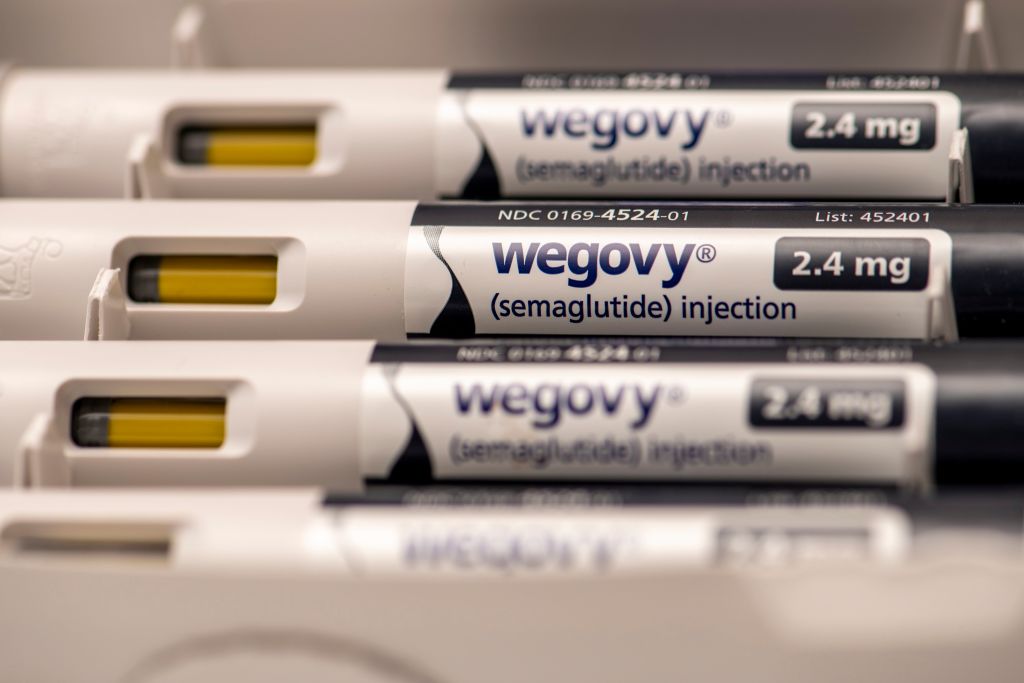
The blockbuster Novo Nordisk obesity drug Wegovy has met the main goals of a pivotal test in metabolic dysfunction steatohepatitis, or MASH, results the drugmaker says support expanding the product’s label to include this prevalent fatty liver disease.
MASH is a metabolic disorder in which the buildup of liver fat leads to worsening function of the organ. In advanced cases, patients require a liver transplant. More than 250 million people worldwide are estimated to have MASH. Wegovy’s main ingredient is semaglutide, an engineered peptide that binds to the GLP-1 receptor to spark metabolic effects. Semaglutide was initially approved for treating type 2 diabetes, where the drug is marketed as Ozempic.
The preliminary results reported Friday are from a placebo-controlled Phase 3 clinical trial enrolling 1,200 participants who have MASH with moderate-to-advanced liver scarring, also known as fibrosis. After 72 weeks, Novo Nordisk said 37% of people who received once-weekly injections of Wegovy on top of standard of care showed improvement in liver fibrosis with no worsening of the fatty liver disease. For those who received a placebo and standard care, 22.5% achieved this goal.
Novo Nordisk also said 62.9% of patients in the Wegovy group achieved resolution of the fatty liver disease with no worsening of liver fibrosis. By comparison, 34.1% of those in the placebo group achieved this goal. The company said the results were enough to be statistically significant. On measures of safety and tolerability, Novo Nordisk said Wegovy was comparable to previous tests of the drug. The company said more detail will be presented at a medical conference later this year.
The latest results are from Part 1 of a two-part study Phase 3 study. The second part is evaluating how well Wegovy lowers the risk of liver-related clinical events compared to a placebo at 240 weeks. Novo Nordisk expects Part 2 of the study will post data in 2029. But based on the clinical data so far, the company expects to file applications seeking U.S. and European Union approval in MASH in the first half of next year.
In a note sent to investors Friday, Leerink Partners analyst Thomas Smith wrote that the data readout is largely in line with the firm’s best-case scenario — statistically significant improvement in fibrosis, but not a game-changing result. Leerink believes this class of peptide drugs have utility addressing some aspects of MASH along with the disease’s comorbidities, such as obesity, type 2 diabetes, and cardiovascular disease. However, Smith said the data confirm Leerink’s thesis that these drugs “do not represent a ‘silver bullet or functional cure for [MASH] patients with advanced fibrosis, and over the long term, we expect polypharmacy and combination use will become standard of care.”
In the view of William Blair analyst Andy Hsieh, the magnitude of fibrosis improvement is similar to that achieved by Rezdiffra, the Madrigal Pharmaceuticals drug that became the first FDA-approved MASH treatment earlier this year. The placebo-adjusted improvement in fibrosis with no worsening of disease for Rezdiffra, a once-daily pill, was 12% compared to 14% for once-weekly injectable Wegovy.
Earlier this year, Eli Lilly and Boehringer Ingelheim each posted encouraging clinical trial results for their prospective MASH therapies. Hsieh said the consensus view within the investment community is that the GLP-1 receptor agonist class will likely be incorporated into the treatment paradigm for MASH.
“It is our view that today’s development adds to the growing body of evidence in support of that trend,” Hsieh said.
Photo: Michael Siluk/UCG/Universal Images Group, via Getty Images






